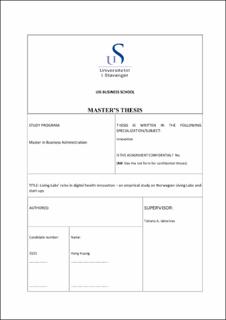| dc.contributor.advisor | Iakovleva, Tatiana | |
| dc.contributor.author | Huang, Hong | |
| dc.coverage.spatial | Norway | en_US |
| dc.date.accessioned | 2020-11-30T10:16:52Z | |
| dc.date.available | 2020-11-30T10:16:52Z | |
| dc.date.issued | 2020-07-27 | |
| dc.identifier.uri | https://hdl.handle.net/11250/2690141 | |
| dc.description | Master's thesis in Business Innovation | en_US |
| dc.description.abstract | The purpose of this master thesis is to clarify the roles of Living Labs and means of collaboration with companies in the digital health context. Interviews with three Living Labs and seven start-ups were organized to develop an in-depth understanding of this phenomenon from the perspective of both parties. Specific attention was paid to their practices and methods of user involvement for developing digital solutions.
Our findings have confirmed the Living Lab’s role as a facilitator and its importance in the innovation system for integrating and orchestrating the network of players, including public sectors, institutes, companies, organizations, healthcare professionals and patients, etc. This study has also confirmed the user inclusion during the innovation process within both Living Labs and start-ups, although the actual practices and methods vary. However, the diversity of theory and practices have resulted in an intricate and scatted landscape for the systemic Living Lab research. The findings show the late engagement between Living Labs and start-ups during the innovation process, which could be an area for future improvement.
We suggest that both Living Labs and start-ups establish the earlier and more robust connection to utilize the potential from collaboration fully, and further studies on this topic are essential as well. There is still a big gap for users to become co-creators in the innovation process. More studies on the methods and tools for effective user involvement and co-creation are required. Future research could consider some combined research methods to generate data from a larger group of innovators/players or conduct some long-term research to evaluate the impact of collaborative actions on the innovation outcome. | en_US |
| dc.language.iso | eng | en_US |
| dc.publisher | University of Stavanger, Norway | en_US |
| dc.relation.ispartofseries | Masteroppgave/UIS-HH/2020; | |
| dc.rights | Attribution-NonCommercial-NoDerivatives 4.0 Internasjonal | * |
| dc.rights.uri | http://creativecommons.org/licenses/by-nc-nd/4.0/deed.no | * |
| dc.subject | økonomi | en_US |
| dc.subject | administrasjon | en_US |
| dc.subject | innovasjon | en_US |
| dc.subject | innovasjon | en_US |
| dc.subject | digital helse | en_US |
| dc.subject | start-up | en_US |
| dc.title | Living Labs’ roles in digital health innovation – an empirical study on Norwegian Living Labs and start-ups | en_US |
| dc.type | Master thesis | en_US |
| dc.subject.nsi | VDP::Social science: 200::Economics: 210::Business: 213 | en_US |

